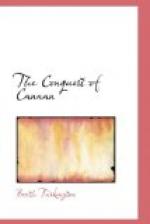They did not fail of assistance. The most powerful influence in the town was ponderously corroborative: Martin Pike, who stood for all that was respectable and financial, who passed the plate o’ Sundays, who held the fortunes of the town in his left hand, who was trustee for the widow and orphan,—Martin Pike, patron of all worthy charities, courted by ministers, feared by the wicked and idle, revered by the good,—Judge Martin Pike never referred to the runaway save in the accents of an august doomster. His testimony settled it.
In time the precise nature of the fugitive’s sins was distorted in report and grew vague; it was recalled that he had done dread things; he became a tradition, a legend, and a warning to the young; a Richard in the bush to frighten colts. He was preached at boys caught playing marbles “for keeps”: “Do you want to grow up like Joe Louden?” The very name became a darkling threat, and children of the town would have run had one called suddenly, “Here comes Joe Louden!” Thus does the evil men do live after them, and the ill-fame of the unrighteous increase when they are sped!
Very little of Joseph’s adventures and occupations during the time of his wandering is revealed to us; he always had an unwilling memory for pain and was not afterwards wont to speak of those years which cut the hard lines in his face. The first account of him to reach Canaan came as directly to the windows of the “National House” as Mr. Arp, hastening thither from the station, satchel in hand, could bring it.
This was on a September morning, two years after the flight, and Eskew, it appears, had been to the State Fair and had beheld many things strangely affirming his constant testimony that this unhappy world increaseth in sin; strangest of all, his meeting with our vagrant scalawag of Canaan. “Not a BLAMEBIT of doubt about it,” declared Eskew to the incredulous conclave. “There was that Joe, and nobody else, stuck up in a little box outside a tent at the Fair Grounds, and sellin’ tickets to see the Spotted Wild Boy!” Yes, it was Joe Louden! Think you, Mr. Arp could forget that face, those crooked eyebrows? Had Eskew tested the recognition? Had he spoken with the outcast? Had he not! Ay, but with such peculiar result that the battle of words among the sages began with a true onset of the regulars; for, according to Eskew’s narrative, when he had delivered grimly at the boy this charge, “I know you —you’re Joe Louden!” the extraordinary reply had been made promptly and without change of countenance: “Positively no free seats!”
On this, the house divided, one party maintaining that Joe had thus endeavored to evade recognition, the other (to the embitterment of Mr. Arp) that the reply was a distinct admission of identity and at the same time a refusal to grant any favors on the score of past acquaintanceship.




